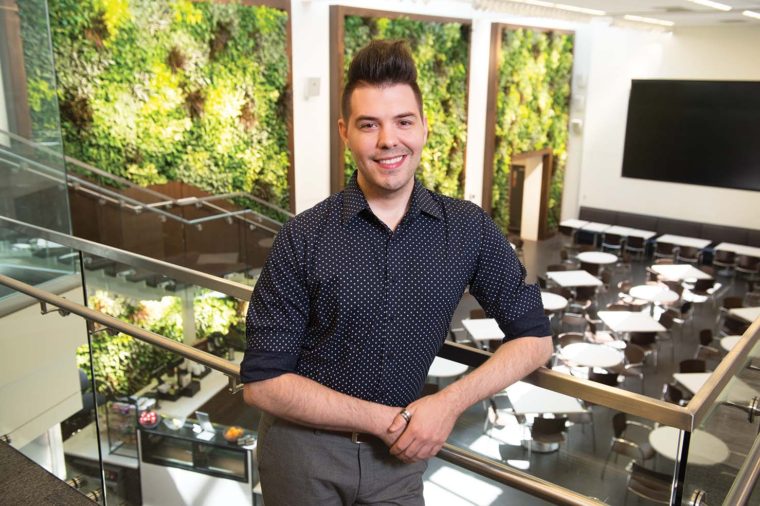When he’s not helping design critically lauded commercial buildings, Xopher Pollard, BFA ’05, is overseeing another, equally important construction project: building bridges between Washington University and its LGBTQIA alumni.
The Chicago-based architect and activist recently became president of the Washington University Pride Alumni Network, or WUpan. The organization, now in its fourth year, hosts receptions and professional networking events for graduating students and LGBTQIA alumni across the country. It also promotes LGBT-friendly policies on campus. “Being involved with WUpan is more than just giving back to the university,” says the 33-year-old Pollard. “It’s a way to celebrate how far LGBT rights have progressed on campus and a way to continue that movement going forward.”
In a state where employers can fire employees simply for having a photo of a same-sex partner on their desk, Washington University is heralded for its inclusive environment. In addition to gender-neutral bathroom options, the university has inclusive housing, so students can choose to live together, regardless of gender. The institution also has a preferred-name initiative, which allows students to officially change their first name on all university records and communications.
Such progressive policies helped earn the school a 4.5-star (out of 5-star) rating from Campus Pride, a nonprofit organization committed to improving the quality of life for lesbian, gay, bisexual, transgender and queer students. WUpan contributes to WashU’s high marks: Members work to recruit students at LGBTQIA college fairs; build a university community of LGBTQIA staff, students and alumni; and fund a yearly scholarship for current students.
Volunteering to improve the lives of others is nothing new for Pollard. At WashU, he had a “very diverse and involved group” of friends. “I always tell people, architectural school made me an architect, but WashU made me a citizen,” he says. As an undergraduate, he served as president of Spectrum Alliance (now Pride Alliance), and these days, he contributes to causes as diverse as ALS Association; National Public Radio; and Polished Pebbles, a mentoring program for African-American girls.
It is Pollard’s relentless commitment to social change that convinced WUpan’s steering committee to elect him as president, says Lars Etzkorn, AB ’87, one of the group’s founders.
In his day job, Pollard also tries to improve the world through beautiful and environmentally friendly design as an architect for Heitman Architects. When he joined the firm in 2014, one of his first projects was helping design the Method soap factory. The trailblazing building is outfitted with a 230-foot wind turbine, sun-tracking solar panels and the world’s largest rooftop garden, all of which helped it become the first-ever industrial building to earn a LEED Platinum rating.
Today, Pollard is leading the design team for the renovation of the AAR corporate headquarters, an eight-phase undertaking that includes a lobby sculpture Pollard designed by adapting the company’s logo. He credits the knowledge he gained from his undergraduate studies in sculpture and film for his contributions to the project’s space planning, branding and furniture design.
“I’ve always been interested in how people relate to spaces and to one another,” he says. “My senior project [at WashU] explored how furniture works as a stand-in for the human body.” This provided him a framework for his later studies. After graduating, Pollard went on to earn three degrees in interior and architectural design.
In addition to an education, the university offered Pollard a safe haven for coming out as an undergraduate. “I didn’t know I wasn’t straight until I was at WashU,” he says. “I grew up in a suburb of Dallas, and being gay there just wasn’t a possibility. It wasn’t an issue of hostility; it was more of an issue of visibility. Gays were simply invisible.” Part of his involvement in WUpan is wanting to create a supportive atmosphere and community for other students like him.
“I have four degrees from three schools,” Pollard says, “but the only place that felt like home was WashU. … In architecture and with WUpan, my goal is to make spaces for others to feel at home too.”
